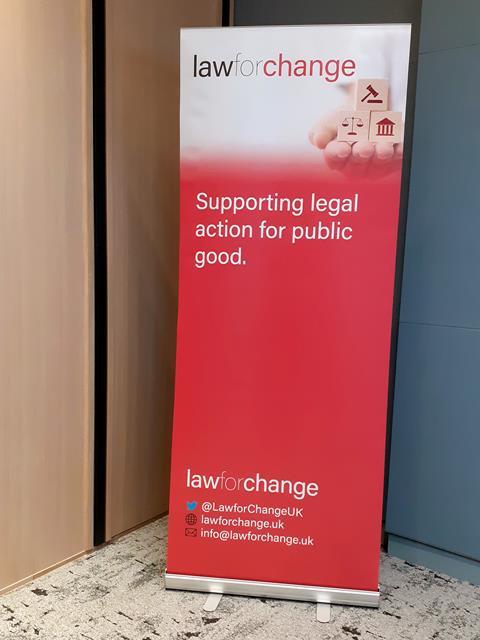Law for Change, the latest entrant to the litigation funding market, may have officially launched on Tuesday, but the organisation has already supported a few high-profile cases. These include a High Court challenge to the government’s controversial Rwanda asylum policy, and civil rights organisation Liberty’s challenge against the Metropolitan Police over the force’s Gangs Matrix database.

Law for Change was established by former City partner Stephen Kinsella; David Graham, founder of Changing Ideas, a charity that supports efforts to address social injustice and human rights; and Charles Keidan, whose own legal challenge resulted in the law being changed to extend civil partnerships to all couples. Through Law for Change, they plan to use the law as a tool to deliver wider social change, increase access to justice, clarify the rights of under-represented groups and bring lasting reforms.
Establishing rights
Speaking to the Gazette ahead of the official launch, Kinsella described the organisation as a funder of last resort. ‘We’re here to support cases in the wider public interest or that benefit an important class of people who otherwise would struggle to get their rights defended,’ he said.
How does Law for Change define ‘wider public interest’? Public opinion, for instance, is divided on the government’s Rwanda asylum policy. Law for Change is not adopting a position on whether individuals should be allowed to come and settle in the UK, Kinsella stressed: ‘There should be due process to establish whether they do have that right.’
Nor does Law for Change think about a case in terms of winning or losing. ‘The case goes to court. It is properly heard by the court. The court gives its verdict. There is proper judicial scrutiny,’ said Kinsella. ‘I do not look at a verdict and think the law on that is wrong – the general answer to that is to run a proper campaign to get the law changed. What we’re doing is making sure it is properly considered by the judge and everyone knows where they stand.’
Law for Change only considers applications from law firms and NGOs struggling to get their case over the line. ‘We’re not set up to look after and hold the hands of individual claimants,’ said Kinsella. He added that it is reluctant to fund claims where the claimant is well resourced or is able cover their own costs, and the team would not be used to enable litigants to flex financial muscle to get the other side to back down.
For example, Kinsella was approached by a firm that needed funding for a case against a local authority. The firm told him the case was ‘legally weak’ but, by taking it on, the council might back down.
‘I said I wasn’t prepared to support a case like that. We’re here to support cases that should be brought but cannot be because of the costs risks or people are being legally bullied. But we’re not going to support a case where, “we could win just by turning up [to court] and it might mean the local authority, which is cash-strapped, would back down”. That’s not what we’re about. It does not feel right or ethical.’
Funding applications made to Law for Change are reviewed by three of the organisation’s 30-strong volunteer panel of legal experts before the founders make a final decision.
Law for Change also has an ‘impact panel’ to ensure it is operating as its founders intended. Basic indicators include securing at least one change in policy, practice or law reform each year as a result of its intervention.
‘We’re here to fill a gap, we’re not here to replace another source of funding. Sometimes it might be a strong case and we’re just providing indemnity against adverse costs,’ said Kinsella. ‘A modest amount of money backing the right case can make a huge difference. The reality is litigation in the UK is needlessly expensive.’
I do not look at a verdict and think the law on that is wrong – the general answer to that is to run a proper campaign to get the law changed. What we’re doing is making sure it is properly considered by the judge and everyone knows where they stand
Stephen Kinsella, Law for Change
Not for profit
Law for Change is set up as a community interest company and most of its funding comes from charitable foundations. Kinsella said it will be rare for the organisation to recover any money it pays out, but that its founders are ‘completely uninterested in a commercial return’. For them, the organisation’s work is ‘purely philanthropic’.
Tuesday’s launch at Kingsley Napley was packed. Guests included members of Good Law Project, the high-profile campaign body founded by barrister Jolyon Maugham, and Public Law Project, which has brought several high-profile challenges against the government.
‘We’re all friends,’ Kinsella told me on the night.































2 Readers' comments